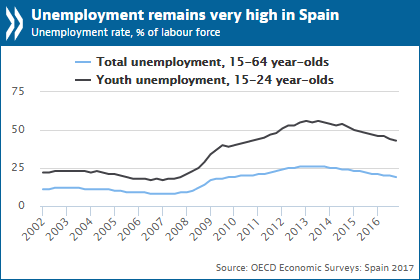Spain: Maintain reform momentum to enhance economic recovery and boost inclusive growth
The Spanish economy is enjoying a robust recovery from a deep recession, with structural reforms contributing to high growth rates and a gradual decline in unemployment. However, further measures to promote innovative business investment and improve skills are needed to both boost productivity and ensure that the benefits of growth reach all Spaniards, according to a new report from the OECD.

The latest OECD Economic Survey of Spain says that growth will be above 2% over the 2017-18 period. Prudent fiscal management and a continuation of the reform process can ensure a return to sound public finances coupled with strong balanced growth.
The Survey, presented in Madrid by OECD Secretary-General Angel Gurría and Spain’s Minister of Economy, Industry and Competitiveness Luis de Guindos, recognises that the economic crisis has resulted in rising levels of poverty and income inequality. It identifies priority areas for making growth more inclusive, including further reductions in unemployment, better poverty reduction policies and improving the quality of jobs through better skills, training and job matching. The report also provides recommendations to make the tax mix more progressive and conducive to job creation, as well as to strengthen the role of the tax transfer system to better address inequalities.
“Despite a challenging global environment, Spain is on the right track”, Mr Gurría said. “Public finances are improving and the important structural reforms implemented over the past years are bearing fruit. While this is an impressive performance, it is critical that the reform momentum be sustained, to surmount the many remaining challenges and ensure a gradual transition to a truly knowledge-based economy. The recovery also needs to be inclusive, addressing inequalities and providing opportunities and improved well-being for all.” (Read full speech)
To sustainably boost incomes and generate better quality jobs, Spain must tackle its chronic problem of low productivity growth by fostering innovative business investment. To do so, the Survey recommends enacting policies to better direct bank, capital market and government financing to the needs of new innovative firms. Some public R&D funding could be shifted from loans to grants and public financing should be reallocated to early stage finance for firms, where market finance is scarcer. Improving the regulatory framework to better promote competition and reforming insolvency laws to allow a faster, less costly recycling of capital is also needed.
The Survey points out that reducing unemployment remains a top priority. Improving skills, extending training programmes and strengthening job placement services, particularly for young people and the long-term unemployed, is critical. Better vocational education and training will also have direct impacts on job matching and productivity.
The report underscores the limited role that transfers play in reducing inequalities and helping those most in need. Increasing the amount and coverage of the regional minimum income support programmes and of cash benefits to families with children could help bring down poverty. So too would tax reform measures like increasing environmental taxes – which would allow increasing revenues that could be used for general policies towards a more inclusive society, while helping curb pollution.
Source: Organization for Economic Co-operation and Development
- 274 reads
Human Rights
Ringing FOWPAL’s Peace Bell for the World:Nobel Peace Prize Laureates’ Visions and Actions

Protecting the World’s Cultural Diversity for a Sustainable Future

The Peace Bell Resonates at the 27th Eurasian Economic Summit

Declaration of World Day of the Power of Hope Endorsed by People in 158 Nations

Puppet Show I International Friendship Day 2020

